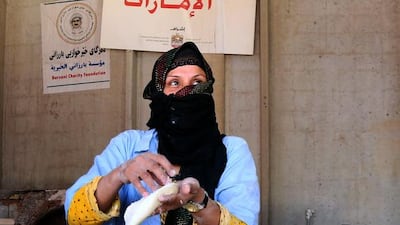ABU DHABI // Despite facing security challenges in many of the places where it operates, Emirates Red Crescent continues to be one of the first organisations to bring aid to those in need.
Since it was founded in 1983, Emirates Red Crescent (ERC) has carried out scores of foreign aid missions and thousands of development projects around the world, benefiting hundreds of thousands of people.
“There is no doubt that we face some challenges while implementing the projects in some countries,” said Fahd bin Sultan, ERC’s deputy chairman for collections and marketing.
“The main challenge is the security situation in certain countries. This could delay the execution of the project during the designated period, which is the case while implementing projects in Palestine, for instance.”
These projects include the construction of residential areas, health facilities, education institutions and utilities buildings.
Often the security concerns result in an increase in the costs of the projects.
“This is beside the other challenges, such as complications faced while trying to issue building licences in some countries, and other bureaucratic procedures,” Mr bin Sultan said.
But he believed it was worth the risks.
“The human is a human everywhere and aiding him is an obligation; standing by his side in crises is a priority regardless of time, place and distance,” he said.
Work on relief missions usually begins immediately after a crisis has hit, whereas development projects in affected areas follow at a later stage.
“This is the hope and recovery phase, to provide stability and necessary services,” he said.
“The biggest executed projects so far are building residential areas to accommodate refugees who find themselves homeless, and those who have been affected by natural and man-made disasters.”
The most significant examples include the Jineen Camp project in the West Bank and the housing scheme in Khan Younis, Gaza. In the aftermath of the 2004 tsunami, ERC also built housing developments in Indonesia and Sri Lanka for victims of the disaster.
The funding for such projects is mostly met through donations. “The authority plays the role of an agent between the donor and the execution of the project, which he has chosen himself,” he said.
Some of the funding comes through appeals, such as the 2013 telethon to raise money for those displaced by the civil war in Syria.
“There are many methods for adopting projects abroad,” Mr bin Sultan said. “Sometimes the receiving party contacts the authority and requests a certain project.”
This year, ERC has been helping the victims of the conflict in Yemen. “The Red Crescent’s move towards foreign aid is in line with the goals and principles of its establishment, and in these situations, it is necessary to have fast response to catastrophes that fall upon people,” Mr bin Sultan said.
hdajani@thenational.ae


